There’s no taking the fight out of these ex-PMs
The turbulence caused by former party leaders this week is part of a growing phenomenon in this country.
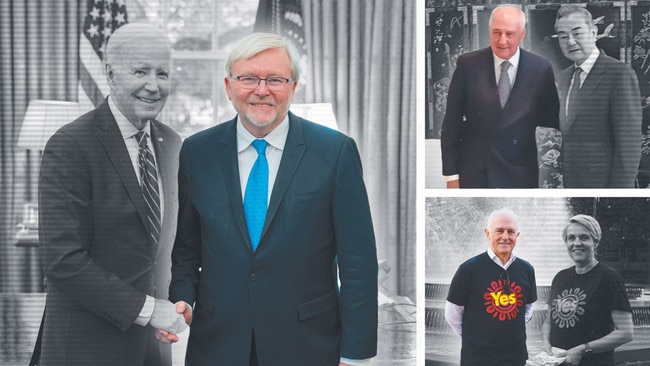
Prime ministers never resign from politics. They can leave parliament, build private sector portfolios, earn more money and pretend to retire. But most are political warriors – internationally recognised, they know how to create trouble and how to promote their cause.
Each does it their own way. There are no conventions, no rules. They function in broken traffic and often succumb to social media ranting. Their numbers keep growing, with Bob Hawke’s 2019 death, they now constitute John Howard, Keating, Rudd, Julia Gillard, Abbott, Turnbull and Scott Morrison, testimony to the revolving door in the prime minister’s office since 2007. They are not a club but a unique class of elders, free agents, accountable to nobody, media magnets, their status guarantees their impact. Their behaviour is often a function of how they lost office, how they feel about it and who they blame. Passion and ambition remain their companions.
Gillard is the most dignified, Rudd the most active, Keating the most lethal and Turnbull the most critical of his party.
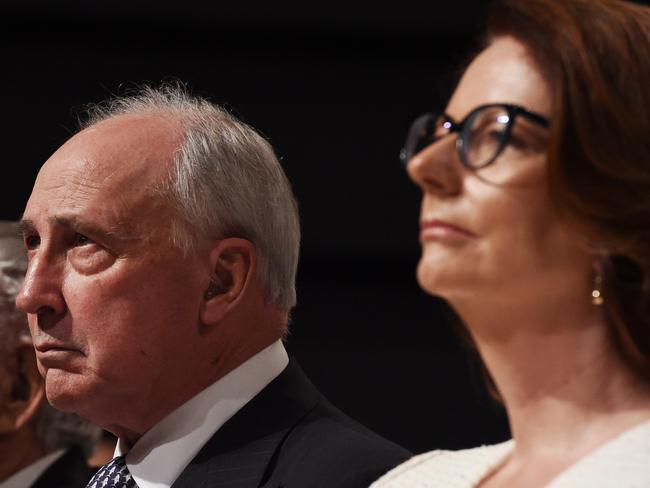
Public opinion is sick of most of them but that doesn’t matter. What’s important is they aren’t standing for election. Their days of chasing votes are gone; their freedom empowers their scope.
This week Rudd was engulfed in the retributive politics of Donald Trump with the Coalition opposition fool enough to exploit Trump’s comments and deploy them in an effort to embarrass the Albanese government.
At almost the same time, Foreign Minister Penny Wong went public to downgrade Keating on the eve of his meeting with Chinese Foreign Minister Wang Yi with her putdown: “Mr Keating is entitled to his views. He does not speak for the government nor the country.” It was an open admission of the pressure Wong feels from Keating’s critique about the foundations of Labor’s foreign policy.
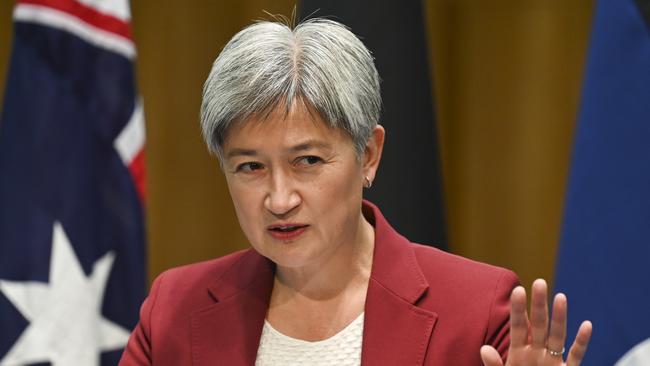
The passions of the ex-PMs are well known. Rudd as a commentator before being an ambassador was a fierce critic of Trump’s presidency, branding Trump “a traitor to the West” and “nuts”; Keating has attacked AUKUS and the Albanese-Wong foreign policy for its antagonism towards China, and claimed Australia was selling out its sovereignty to the US; Abbott, while staying neutral in the US presidential contest, repudiates Trump for missing the threat to the Western democracies and supporting Russia’s Vladimir Putin over Ukraine; Turnbull has assailed his successors, Morrison and Peter Dutton, and campaigns to sink AUKUS, a creation of Morrison, in a repudiation of Turnbull’s deal with the French; while Howard, conventionally loyal to his party, speaks on a range of issues and broke decisively from Trump over his refusal to accept defeat at the ballot box.
You can’t take the politics out of these ex-PMs. Deep in their hearts most think they could be doing a better job than the incumbents. Howard, Keating, Rudd and Morrison departed because they lost an election. There’s a finality about the public’s judgment, no issue here comparable to Trump’s dishonest complaint he was robbed.
Acceptance is harder when the leader is terminated by their colleagues in the partyroom – that happened with Abbott, Turnbull and Rudd, though Rudd came back. Morrison was the only one of the three recent Liberal prime ministers to survive without a partyroom revolt.
These ex-PMs are veterans of our Westminster parliamentary system, where the prime minister is merely “first among equals” without the elevated status of a presidential system. These days most defeated PMs have loads of energy and aspire to leaving their mark. They write, talk and advise.
This week Rudd and Keating were the lightning rod for inflamed emotions. Rudd’s history as an ex-PM is turbulent. He campaigned to become secretary-general of the UN and, in the process, triggered a trauma within the Turnbull cabinet, a split between Turnbull as PM opposed to Rudd and Julie Bishop as foreign minister supporting him. When Turnbull finished Rudd’s campaign by having the Australian government refuse to support him, he said Rudd got personal, saying to him: “You little f..king rat, you piece of shit.”
Rudd served as chief executive of the Asia Society, did a doctorate at Oxford, established an international reputation as an analyst of China policy and in 2023 he returned to public service as ambassador to the US, a captain’s pick by Anthony Albanese with reservations from minister Wong.
In Washington, Rudd has made a difference. He has pursued Australia’s national interest with the Biden administration and with the congress, worked both sides of US politics, cultivated pro-Trump Republicans and lobbied to help secure the AUKUS legislation.
It was unsurprising that Trump denigrated Rudd in his interview with Nigel Farage on GB News, broadcast in Australia by Sky News, saying he didn’t know much about Rudd but had heard he was “a little bit nasty” and added “if he’s at all hostile, he will not be there long”. From Trump it was pretty feeble stuff, but it ignited a firestorm at home. Of course, Trump would never have been asked about Abbott’s publicly searing rejection of Trump’s view of the world, no point doing that.
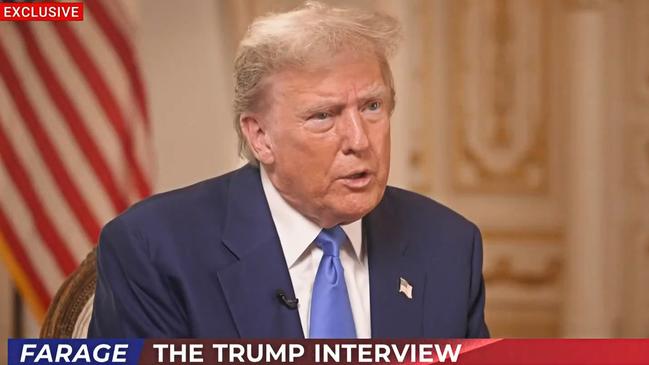
It was obvious Trump knew next to nothing about Rudd, but in a set-up question he said what was expected of him. The Coalition couldn’t help itself. It blundered, not just by making this an issue but by directly quizzing Albanese in parliament about whether he would reassess Rudd’s position as ambassador.
Sure, if Trump issues a throwaway line seven months before the US election, a panicked Australia should betray its weakness and get into a tizzy about recalling Rudd. Have you ever heard such nonsense? Yet it was faithfully repeated by much of the pro-Trump media. Albanese and Wong, unsurprisingly, stood by Rudd and Wong said he would remain as ambassador if Trump became president.
Do people hate Rudd so much they are prepared to undermine their own country with the US?
Yes, evidently. Speaking to Inquirer, former ambassador to the US Dennis Richardson, a former head of the Foreign Affairs and Defence departments, said: “Rudd has advanced our national interest in Washington and worked both sides of the political aisle.
“Those people pursuing Rudd on this issue are doing so for political purposes divorced from the national interest.”
That’s a critique of the Coalition and sections of the media. Perceptions matter. It looked like the Coalition was backing Trump against Rudd – that’s not the Opposition Leader’s position but the Coalition has some hard thinking to do. If Trump becomes president, the Albanese government will face a challenging job to maintain effective ties with the US and the stakes will be huge; witness AUKUS. How does the Coalition balance its competing interests between supporting the US alliance and promoting trouble between Trump and Australia to undermine Albanese?
Rudd, of course, is completely culpable; his career switching has caught him out, the ambassador now haunted by his previous free-lancing as a commentator. Rudd’s diplomatic skills will be put to the test in a fascinating contest: can his unrivalled ability as a networker overcome Trump’s resentments? It will be compelling stuff to watch.
Nobody knows what attitude Trump might take towards Rudd, let alone whether Trump will even get to the White House. Trump can turn on a dime, and then turn again. Recall he denounced Turnbull in their notorious phone call over the refugee deal before deciding Turnbull was his mate and then started granting Australia trade concessions. Inconsistency is Trump’s brand.
In his meeting with the Chinese Foreign Minister, Keating delivered an overview of Labor’s historical attitudes towards China and said after the meeting they focused on the big-picture outlook and “the geo-strategic balances and influences”. They agreed on the long-run strength of China’s economy and that Australia’s future lay in deeper integration with East Asia. Wang told Keating that China was still only 55 per cent urbanised – an issue Keating has seized upon in the past to argue for the vast reservoirs of growth yet to come.
The reality is that China met Keating aware that he is a critic of Albanese-Wong policy, having argued Labor is too aligned with the US, too negative towards China, too influenced by the security agencies, fatally attached to AUKUS and has failed to grasp the full potential in bilateral ties with Beijing.
Rarely has a former prime minister so robustly sought to challenge a foundation stone of the foreign policy of his own party.
Wong’s statement to this paper before the meeting – that Keating did not speak for Australia – was extraordinary. In effect, she was saying Keating had no influence on government policy. The reality, however, is that Keating does influence sentiment inside the Labor Party and Beijing wants to promote Keating’s standing in the Australian domestic debate about China policy.
Majority sentiment within the government is that Keating should not have agreed to the meeting following China’s invitation. But nobody in the Albanese government will say that. Climate Change and Energy Minister Chris Bowen, took a different tack, saying there was nothing unusual about a former prime minister meeting a visiting foreign minister. Technically, that’s right. But Bowen deliberately missed the point.
Keating is the most dangerous critic of the Albanese-Wong foreign policy because he comes from inside Labor, he has the capacity to influence opinion and prosecutes his case with the devastating intent that marked his career. The government cannot silence Keating but cannot engage him in debate because that would further publicise his position.
Opposition foreign affairs spokesman Simon Birmingham, said it was “somewhat insulting towards Penny Wong and the Albanese government for that meeting to be taking place”. He underlined the obvious: no comparable meeting would be tolerated in China between a visiting Australian foreign minister and a Chinese figure critical of the Beijing government.
A feature of Wong’s meeting with the Chinese Foreign Minister was her firm line as relations are being stabilised – she said Australia was shocked at the suspended death sentence imposed on our citizen Yang Hengjun; repeated her desire that China lift all restrictions on Australian exports; raised human rights concerns over Xinjiang, Tibet and Hong Kong; and expressed “serious concern” about unsafe conduct at sea, the need for peace and stability in the Taiwan Strait and the need for international law to prevail in the South China Sea.
In recent weeks both Abbott and Turnbull have been conspicuous in running their causes. Abbott has targeted Trump, alarmed at the isolationism of pro-Trump Republicans in congress and the push to terminate aid to Ukraine, a position Trump champions.
In an interview with The Australian, Abbott said it was “absolutely critical” to stop Putin because his victory would trigger “a new Cold War in Europe”. Identifying his fears about a Trump presidency, Abbott said: “If America puts down the responsibilities of leadership, it will be a much more fraught and darker world. So I would plead with the Americans not to put at risk everything that American benevolence and strength has achieved over the last seven decades.”
Abbott is warning the pro-Trump conservatives in Australia to be cognisant of what their support for Trump might actually mean. It testifies to something deeper – the schism across the West about the meaning of conservatism in 2024.
Turnbull, meanwhile, seems to have intensified his campaign against AUKUS in an assault on the joint Labor-Coalition support for nuclear-powered submarines for Australia, a bipartisanship shared between Albanese and Dutton. Championed by Labor, AUKUS is an article of faith within the Liberal Party.
Earlier this month Turnbull seized on reductions in US submarine construction to warn that America would need to increase submarine construction for its own needs and was not going to risk its own fleet by selling Virginia-class submarines to Australia. His argument, in short, was that the US Navy would not agree to this compact, that Australia had “abandoned its sovereignty” and was hostage to US politics.
It is another extraordinary situation – a former Liberal prime minister warning that the strategic centrepiece of the former Liberal government, now being advanced by Labor, is flawed, dangerous and doomed to fail.
Never in Australia’s history have the former prime ministers, in their different ways, been more prominent, contentious and sometimes reckless in their public stances and campaigns. It is now part of our political culture and is unlikely to change.


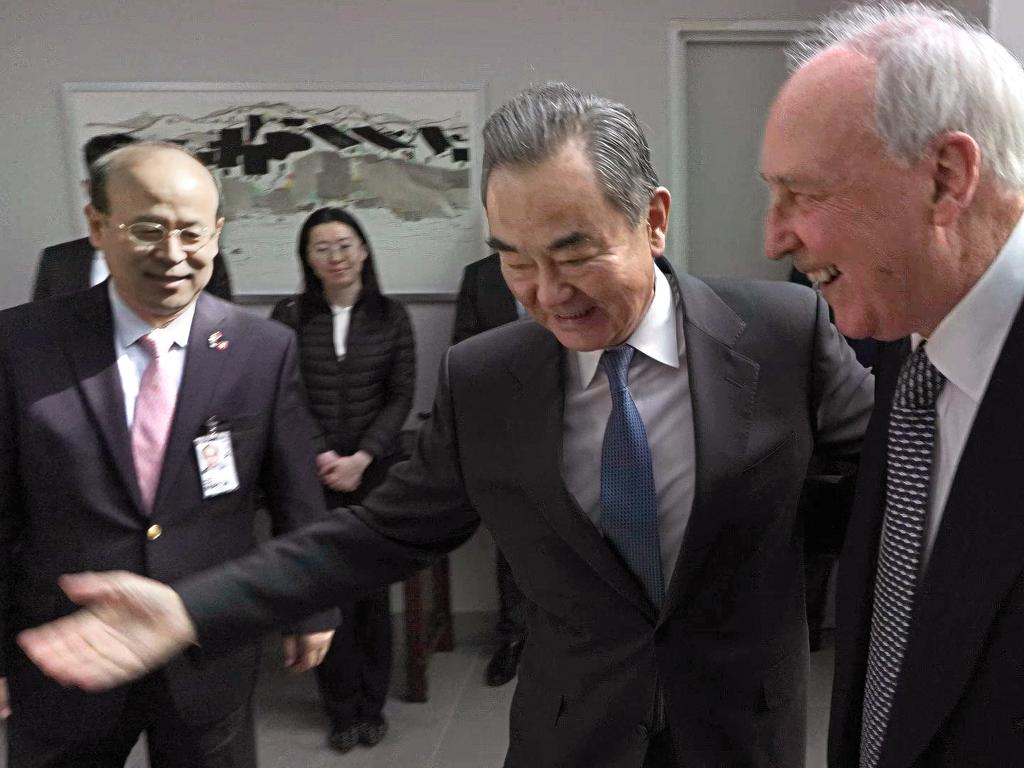
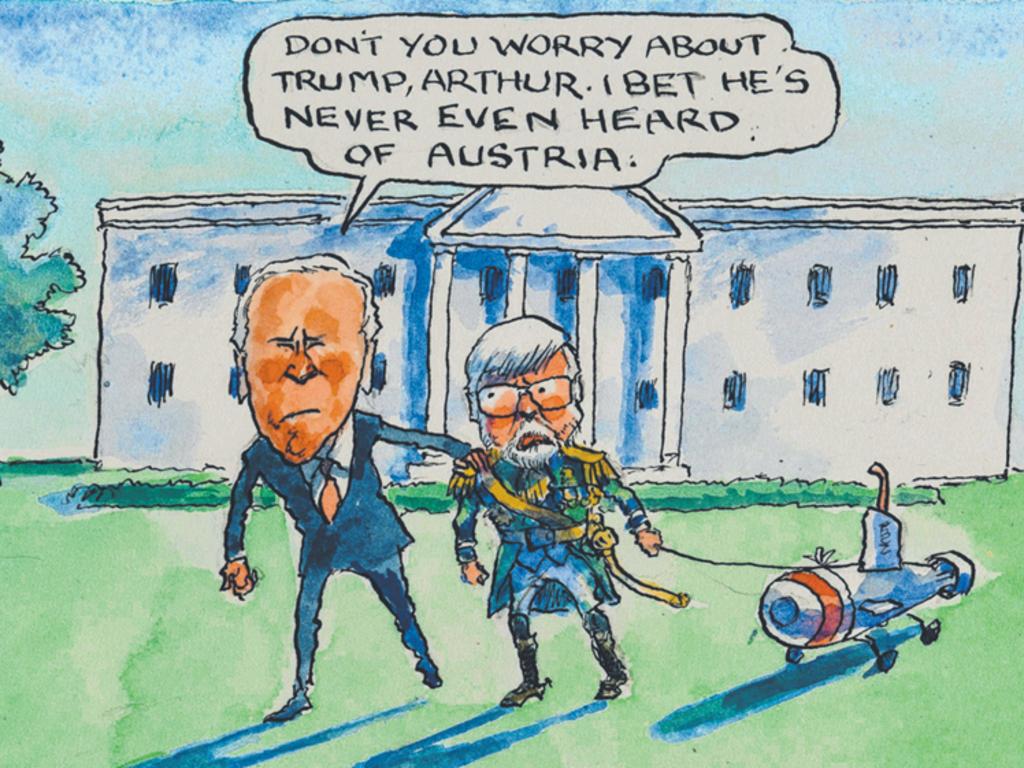

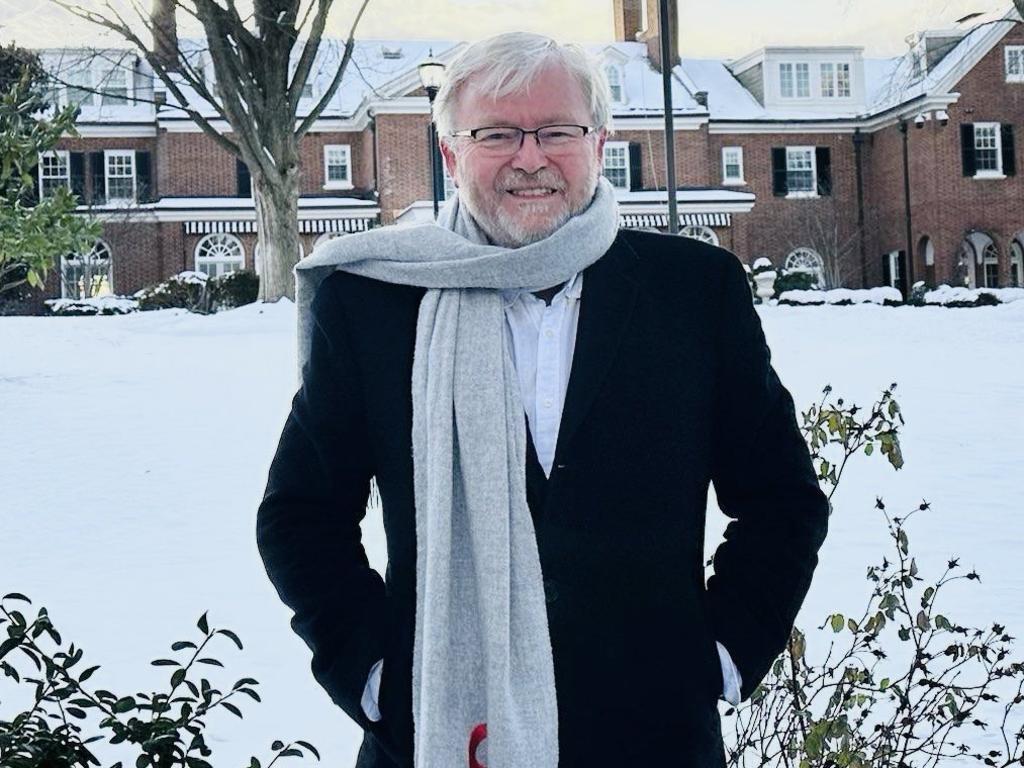


The phenomenon is growing in prominence and unpredictability. It is Australia’s post-prime ministerial politics – with the Albanese government and Dutton opposition having to manage the dramas and challenges around Kevin Rudd, Paul Keating, Malcolm Turnbull and Tony Abbott.